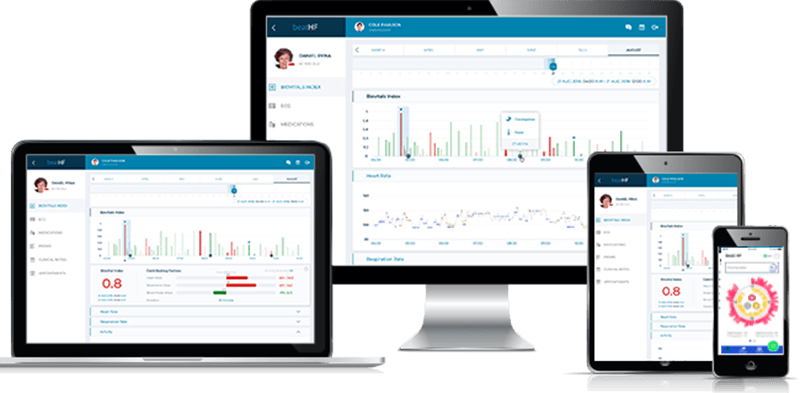
Biofourmis has entered a research partnership with the Yale University-Mayo Clinic Center of Excellence in Regulatory Science and Innovation (CERSI). Biofourmis’ mobile platform BiovitalsHFTM will be leveraged in a study of patients with heart failure to monitor functional capacity and quality of life to see if greater emphasis should be placed on these measures in the drug approval process.
Impact of Heart Failure
Heart failure afflicts approximately 6.5 million patients in the United States and 26 million worldwide, causing substantial mortality and morbidity, and has major effects on physical function and quality of life. FDA recognizes in its recent draft guidance, Treatment for Heart Failure: Endpoints for Drug Development Guidance for Industry, that an effect on symptoms or physical function, without a favorable effect on survival or risk of hospitalization can be a basis for approving drugs to treat heart failure.
“This joint project has the potential to advance the science of clinical trial design,” said Kuldeep Singh Rajput, CEO of Biofourmis. “Ultimately, this study could open the door for regulatory agencies to consider including patient-centric endpoints in the drug approval process—which could potentially speed the regulatory approval process.”
Yale-Mayo CERSI Overview
The Yale-Mayo CERSI is a joint effort between Yale University, Mayo Clinic and the U.S. Food & Drug Administration (FDA). CERSIs are collaborations between FDA and academic institutions to advance regulatory science through innovative research, training and scientific exchanges. To demonstrate the feasibility and reliability of capturing these new patient-centric endpoints, Biofourmis and Yale-Mayo CERSI will conduct a multicenter study beginning in August 2019 of recently discharged patients with heart failure, who will be screened and then monitored at home for 60 days.
Using Wearable Biosensors to Detect Heart Failure
Patients will be monitored using Biofourmis’ BiovitalsHFTM, which is a sensor-agnostic mobile health platform compatible with leading clinically validated, FDA cleared, and medical CE-marked wearable biosensors. BiovitalsHFTM captures raw biosensor data and uses advanced machine learning to derive dozens of physiology biomarkers and is able to detect heart failure decompensation using multi-variate physiology analytics, weeks in advance.
Study Details
In this study, BiovitalsHFTM will be used to capture multiple physiology biomarkers and physical activity continuously in real-world settings, using two wearable biosensors: a medical-grade device called Everion® and the consumer wearable smartwatch Apple Watch Series. Apart from using the BiovitalsHFTM patient-facing companion app for syncing physiology data from sensors, it will be used to capture electronic patient-reported outcomes (ePROs) such as medication adherence, symptoms, the Kansas City Cardiomyopathy Questionnaire (KCCQ) responses, and the guided mobile-based 2-minute-step-test.
The primary goal of the study is to measure the correlation between physiology and actigraphy biomarkers with clinical endpoints such as lab results, the KCCQ, and the six-minute walk test (6MWT). The data also will be used to assess medication adherence, dose changes and percentage of patients on target dosages of Guideline Directed Heart Failure Therapies.
Why It Matters
“Biofourmis is a leader in the emerging field of digital therapeutics, and we are thrilled to be partnering with them on this important study,” said Nilay Shah, PhD, Principal Investigator at the Yale University-Mayo Clinic CERSI. “This study will not only advance science, but will also provide insights to the FDA on how these measures can be used as alternative trial endpoints.”
Rajput explained: “We have entered into a new era in clinical trial design that encourages patient engagement and values quality of life. By leveraging our user experience, powerful data-analytic capabilities and vendor-agnostic sensor compatibility, we are excited about the prospect that Biofourmis will play a part in establishing new patient-centric endpoints for clinical trials, starting with heart failure.”
